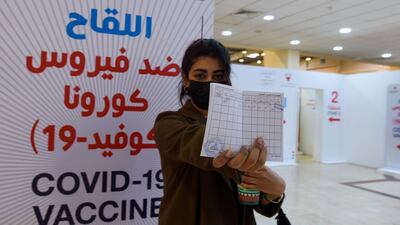As nations start rolling out Covid-19 vaccines, many hope that the final weeks of 2020 mark the beginning of the end of the pandemic. It is remarkable that these inoculation programmes have begun only a few months after the first lockdowns ground much of the world to a halt. At the time, experts were predicting that it could have been as much as a couple of years before we had vaccines. The international medical community, therefore, has achieved something astonishing. But the world is still a long way off total recovery. And this will need to be a vaccine introduction like no other.
In the UAE, China's Sinopharm vaccine has been approved for use after a 31,000-person trial here. Dubai has also announced that the German-made Pfizer vaccine will be offered for free to residents who are most at risk from Covid-19. Logistically, the distribution seems to be working, with public and private clinics across the country offering the vaccine hassle-free.
In other countries, things have been less smooth. US federal officials had for some time been promising to vaccinate 20 million Americans by the end of the year. This no longer appears likely. Official statistics as of Monday showed that only 11.4 million doses had been administered. Some say low numbers come from data lags. This will be true to an extent, but the scale of early difficulties point to other more systemic failings. Dozens of states say they have not received the number of vaccine doses that were promised, and others are lacking the sophisticated and sensitive facilities required for storing them. Distribution on this scale can also be difficult within a highly privatised and decentralised healthcare system.

Other larger international bodies are having a better time. Many were worried that the stress placed on the EU by the pandemic, alongside issues such as Brexit, would deepen pre-existing rifts between member states. Recent news of the bloc agreeing on a $750 billion Covid-19 recovery fund, the first ever debt union in its history, counters this fear. The EU's collaborative success stands in contrast to the isolationist approaches adopted by some world leaders, and whose reputations are suffering more as a consequence.
But the scale of the challenge ahead means most people will still need a great deal of patience, particularly those living in the many countries that do not have the clout to acquire doses as quickly as more powerful nations. This is not helped when rich countries ignore their moral responsibility to help poorer nations access jabs. Canada, which has ordered the largest number of vaccines per capita, has enough doses to inoculate each citizen five times over.
The battle also has other fronts beyond just the need to vaccinate. Misinformation is dissuading many from taking the shot, with some countries having only 50 per cent of their populations willing to take a vaccine, well below the rate necessary to stop the virus spreading. The introduction also prompted something of a medical space race, in which countries rushed to produce a vaccine, partly to advance the medical fightback, but also partly for geopolitical point scoring. However, such competition, while being reminiscent of Cold War-era technological races, probably reduced the time it took to develop vaccines.
We can afford some relief as the inoculations begin. But future difficulties remain to make such a unique and historic vaccine rollout successful. Recent news represents the end of the beginning, more than it does us being at the beginning of the end in the war against Covid-19.


